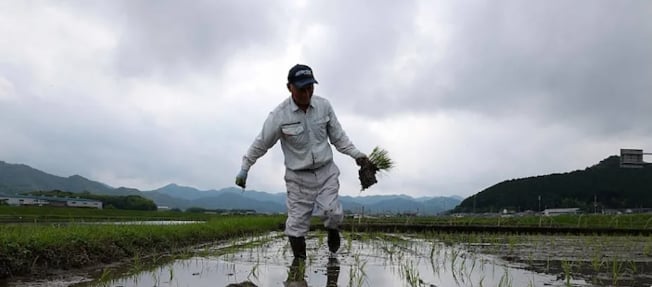December 15, 2025 | 13:55 GMT +7
December 15, 2025 | 13:55 GMT +7
Hotline: 0913.378.918
December 15, 2025 | 13:55 GMT +7
Hotline: 0913.378.918

Photo: Buddhika Weerasinghe/Getty Images.
Public support for Ishiba's administration has tumbled to its lowest level since he took office last year, partly because of frustration over the cost of living.
One of the main sources of anger has been inflation and in particular the surging cost of rice, as well as scandals within the ruling party.
The price of the grain already rocketed 101 percent year-on-year in May, having jumped 98.4 percent in April and more than 92.5 percent in March.
Overall, Japan's core inflation rate slowed to 3.3 percent last month from 3.7 percent in May, the data from the internal affairs ministry showed.
The reading, which excludes volatile fresh food prices, was slightly below market expectations of 3.4 percent.
Excluding energy and also fresh food, consumer prices rose 3.4 percent, compared with 3.3 percent in May.
Opinion polls ahead of Sunday's election suggest the ruling coalition may lose its majority in the upper house.
This could force Ishiba to resign after less than a year in office.
In October, his coalition was deprived of a majority in the powerful lower house.
It was the worst election result in 15 years for the Liberal Democratic Party (LDP), which has governed Japan almost continuously since 1955.
- Tariff pressure -
Ishiba is under additional pressure to reach a trade deal with the United States before new tariffs of 25 percent take effect on August 1.
Japan's important auto imports into the world's biggest economy are already subject to painful levies, as are steel and aluminium.
US President Donald Trump wants to get Japanese firms to manufacture more in the United States, and Tokyo to buy more US goods -- notably gas and oil, cars and rice -- to reduce the $70 billion trade deficit with the Asian powerhouse.
Ishiba, who has sent his trade envoy Ryosei Akazawa to Washington seven times to try and broker a deal, was due to host US Treasury Secretary Scott Bessent on Friday.
Akazawa was also set to join the talks, and travel with Bessent to visit the World Expo in Osaka on Saturday, the Japanese government said.
The Bank of Japan has been tightening monetary policy since last year as inflation crept up but worries about the impact of US tariffs on the world's number four economy has forced it to take a slower approach.
Factors behind the rising price of rice include shortages due to an intensely hot and dry summer two years ago that damaged harvests nationwide.
Since then some traders have been hoarding rice in a bid to boost their profits down the line, experts say.
The issue was made worse by panic buying last year prompted by a government warning about a potential "megaquake" that did not strike.
The government has taken the rare step of releasing its emergency stockpile since February, which it typically only ever did during disasters.
"Policy flip-flops, delayed pass-through from producer to consumer prices, and yen depreciation will keep price pressures elevated in the near term," said Stefan Angrick at Moody's Analytics.
"With nominal pay gains stuttering, real wages won't get the lift they need any time soon. And pay growth will likely slow further as US tariffs and tariff threats hit manufacturing and employment conditions," he said in a note.
"This leaves the Bank of Japan in a bind... We expect the BoJ will stay on hold for now, but not for long. A rate hike is likely by January and could come as early as December."
AFP
/2025/11/24/3616-2-141832_513.jpg)
(VAN) FSC certification has helped increase the value of thousands of hectares of planted forest timber under the management of the Xuan Loc Protection Forest Management Board, particularly in terms of selling prices.

(VAN) More than 100 shoppers queued for a chance to get a kilo or so of Japanese rice for 500 yen ($3.32) by heaping as much grain into a small wooden box as possible.

(VAN) Benchmark international prices of milled declined in October as harvests started or improved in some parts of the globe.

(VAN) Show cause orders will be issued to retailers who sell imported rice at prices exceeding the maximum suggested retail price (MSRP) of P43 per kilo, Philippines Agriculture Secretary said in a statement on Thursday.

(VAN) Coffee prices on October 20, 2025, remained stable domestically, trading at 113,500–114,500 VND/kg. Similarly, global coffee prices also moved sideways.

(VAN) By October, Vietnam’s coffee exports had surpassed USD 7 billion for the first time and will exceed USD 8 billion within this year.

(VAN) Illinois rancher says Texas, Oklahoma, Kansas lost grass and forage, forcing massive cattle liquidation.